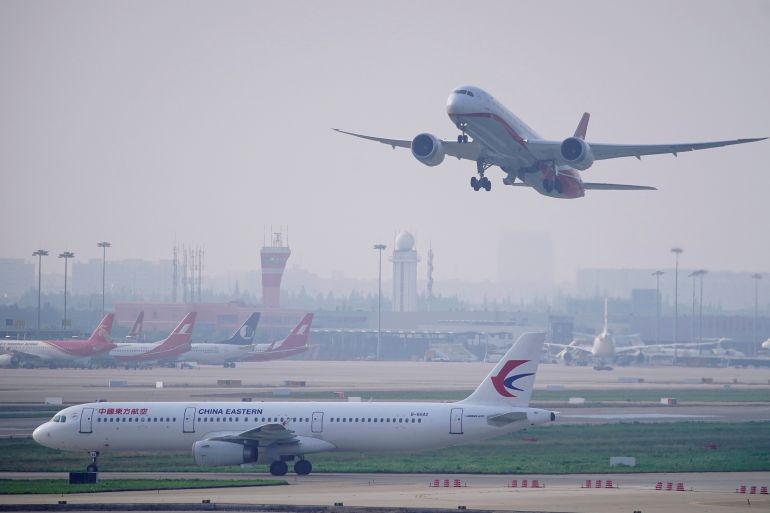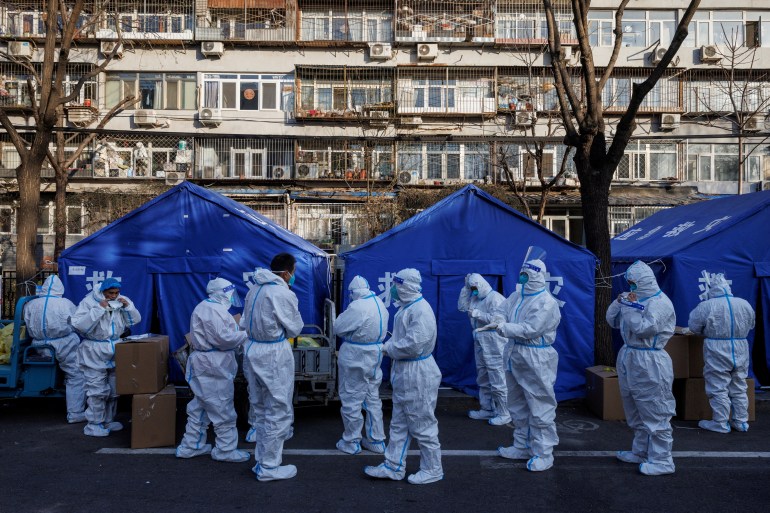China’s lingering COVID fears cloud global travel rebound
Chinese spent $288bn on international travel in 2018, nearly one-quarter of the global spending on tourism.

Beijing, China – Zhou Jing, a 36-year-old business owner in China’s Hebei province, is relieved that Beijing has begun to unwind its harsh “zero-COVID” strategy.
After taking strict precautions to avoid COVID-19 for the past three years, Zhou finally tested positive for the virus earlier this month as cases surged nationwide.
Keep reading
list of 4 itemsWhat travel restrictions is the EU imposing on Russians?
‘Russians should feel the burden and consequences of this war’
Global air travel rebounds to 74 percent of pre-pandemic levels
Unlike millions of Chinese affected by the virus earlier in the pandemic, Zhou was able to recover at home instead of at a quarantine facility.
Earlier this month, Beijing announced it would “optimise” its COVID policies by allowing mild cases to quarantine at home, as well as limiting lockdowns, scrapping mass testing, and lifting curbs on domestic travel.
Zhou was glad to be able to face the illness surrounded by her loved ones, and she is happy to know she will not be restricted from doing everyday errands like going to the supermarket in the future.
Still, Zhou, who runs a small tour agency, is not likely to travel far beyond her home anytime soon.
For Zhou, international travel — something she did at least twice a year before 2020 — is off the table for the foreseeable future due to the risk of the virus, even if the borders are reopened in the coming weeks or months.
“I know you can get COVID-19 anywhere now, but at least here in China, I’ll be with my family,” Zhou told Al Jazeera. “Here, the current variant [Omicron] seems more stable. If I go abroad, I fear the virus may mutate.”
Zhou is not alone in being apprehensive.

In a survey of 4,000 Chinese consumers carried out by consultancy Oliver Wyman in late October, more than half of respondents said they plan to put off travel abroad, even if the borders reopen tomorrow, with fear of infection cited as the top concern.
“People have become cautious,” Imke Wouters, a retail and consumer goods partner at the consultancy, told the Reuters news agency. “So even when they can travel, we don’t think they will come back right away.”
Such nervousness could pose a challenge to the international tourism market’s nascent recovery from the pandemic, which has been held back by China’s ongoing border closures. China’s population spent $288bn on international travel in 2018, nearly one-quarter of the global spending on tourism.
Other data suggests that Chinese may be eager to travel so long as the government lifts its myriad restrictions on moving in and out of the country.
Dragon Trail International, which focuses on the Chinese outbound travel market, surveyed 1,003 people on the mainland between November 7 and 20 and found that more than half of the respondents would head abroad within one year of reopening.
That survey found that “quarantine, strict policies, and inconvenience,” rather than fear of the virus, were the biggest barriers to travel, with 60 percent of respondents expressing hope quarantine-on-arrival will be relaxed.
Lily Zhang, a small business owner in Tianjin, said she was ready to travel solo abroad and do business with international clients in 2023. But she said she is less confident she will be able to travel with her family, especially since her husband returned to Tianjin just last month after nearly three years of being stranded in the Philippines.
“I don’t mind being hit by COVID-19 anymore, even if I get it from abroad,” Zhang told Al Jazeera. “But it would be hard if our children become sick because it would become an added responsibility. We hope to be clear about the rules upon arriving so we can decide to travel as a family.”
Simon He, who is studying for a postgraduate degree in Denmark, said he has decided to return to China in January for an exchange program in Shanghai despite the obstacles, which include eight days of quarantine upon arrival.
After contracting COVID-19 in October, He is confident he can manage the disease if he gets it at home and is looking forward to travelling next year.
“Getting COVID-19 is inevitable,” He said. “Although cases may peak during the Spring Festival holiday, I believe things will be better. I will consider travelling more after that.”

For some Chinese, domestic travel may be a substitute for a holiday abroad.
“The recent removal of restrictions around internal travel in China bodes extremely well for the recovery of Chinese domestic tourism in the coming months and beyond,” Sienna Parulis-Cook, Dragon Trail’s marketing and communications director, told Al Jazeera.
Parulis-Cook said Hainan is likely to make a comeback as a domestic getaway, as will Zhangjiakou and other popular “winter tourism” locations.
But Josie Chen, a travel agency operator, expects domestic tourism, especially high-end luxury hotels and ski resorts, will take a hit from 2023 because “many Chinese are eager to head out”. Her company’s data indicates that most affluent Chinese travel to European or North American countries to buy luxury goods.
“Everyone hopes that borders will reopen soon, but somehow, this isn’t good for our business,” Chen told Al Jazeera. “Domestic travel agencies yet again need to explore the market and change our business model if we are to survive another year.”
Parulis-Cook believes that expectations towards domestic and outbound travel in China “will adjust accordingly”.
“The change in messaging in China now from officials and the media, to stressing that COVID-19 is actually a very mild illness, should also go a long way towards assuaging any virus-related fears about travelling outbound,” she said.
Both Chen and Parulis-Cook said Hong Kong is the first choice of Chinese travellers they communicate with.
China’s border with Hong Kong has been effectively closed since early 2020, although the Asian financial hub last week lifted a three-day monitoring period under which international arrivals were prevented from entering bars and restaurants immediately upon arrival.
Chen said Southeast Asian countries might see an influx of Chinese travellers next year.
Parulis-Cook said she expects the five-day Labour Day holiday in April and May will be the first prime period for outbound trips.
Still, Zhou feels it will not be the right time to travel until coronavirus “is weakened or contained globally”.
“A lot of young people who didn’t travel for a few years will be eager to get out,” Zhou said. “But my biggest worry is when they get sick after going abroad. They may come back with a more extreme variant, and that will just cause more trouble for everyone.”
For others like Zhang, life must go on.
“I don’t want COVID-19 to bother me anymore,” Zhang said, adding that she hopes Chinese people learn to live with the coronavirus. “I just ignore it. My life is not meant to be only about the pandemic.”